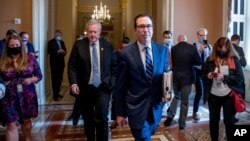White House officials and top congressional Democrats plan to meet again Wednesday for a third day of talks on a new coronavirus aid package, which they hope to have by the end of the week.
Treasury Secretary Steven Mnuchin said after 90 minutes of negotiations Tuesday that the goal was to finalize the proposal in the coming days to allow for a vote in Congress next week. Those taking part in the discussions include White House Chief of Staff Mark Meadows, House Speaker Nancy Pelosi and Senate Democratic Leader Chuck Schumer.
“We really went down issue by issue by issue, slogging through,” Schumer said after Tuesday’s session. “They made some concessions, which we appreciated. We made some concessions, which they appreciated. We are still far away on a lot of the important issues, but we’re continuing to go at it.”
Meadows called the session “probably the most productive meeting we've had to date."
The two sides have been divided by the size of their proposed aid packages, with Democrats calling for $3.4 trillion in new spending and Republicans wanting to limit it to $1 trillion.
Among the items under discussion are sending out another round of stimulus payments, helping renters avoid eviction, aiding the U.S. Postal Service and action to address $600-per-week federal unemployment payments that expired last week.
“The Speaker and the Democratic Leader continue to insist that federal unemployment assistance should pay people more not to work than the essential workers who’ve kept working,” Senate Majority Leader Mitch McConnell said Wednesday.
“This isn’t just bad economics if you’re trying to reopen a country. It’s also just unfair, in the simplest terms. Republicans want to keep providing some supplemental federal unemployment. We just don’t think it is remotely fair for the federal government to tax essential workers who’ve kept working every day so Uncle Sam can pay their neighbors a higher salary to stay home,” McConnell said.
Republican leaders have proposed passing a smaller aid package that addresses some items while leaving negotiations on others for later. Democrats have dismissed that approach, arguing instead that the federal government needs to take big action to confront the economic challenges facing the country.
“This is the greatest economic crisis America has faced in 75 years. The greatest health crisis in 100. There must be a relief package commensurate with the size of this historic challenge. A skinny package, a package that doesn't solve so many of the problems that America faces, would hurt the American people,” Schumer said Wednesday.
The White House criticized Democrats for blocking passage last week of a short-term bill that would have extended the unemployment benefits for seven days, giving congressional leaders more time to negotiate.
“That should tell you exactly where the Democrats stand,” White House press secretary Kayleigh McEnany said in a briefing Tuesday.
But Democrats are aware they have a better negotiating position since the Senate Republican leadership needs their votes for passage.
McConnell acknowledged Tuesday he would not have full Republican support as he did in March when Congress quickly agreed on a massive aid package addressing the beginning of the crisis.
“If we're looking for a total consensus among Republican senators, you’re not going to find it," McConnell told reporters. “So, we do have divisions about what to do. What we're hoping for here is a bipartisan proposal negotiated by the president of the United States and his team and the Democratic majority in the House to sign a bill into law that can appeal to a significant percentage of Republicans.”
Mnuchin has signaled some flexibility, telling reporters Monday, "We're open to a bigger package if we can reach an agreement.”




